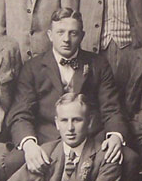Tommy Smyth (rugby player)
 |
|||||||||||||||||||||||||||||
| Full name | Tommy Smyth | ||||||||||||||||||||||||||||
|---|---|---|---|---|---|---|---|---|---|---|---|---|---|---|---|---|---|---|---|---|---|---|---|---|---|---|---|---|---|
| Date of birth | 1 December 1884 | ||||||||||||||||||||||||||||
| Place of birth | Belfast, Ireland | ||||||||||||||||||||||||||||
| Date of death | 15 May 1928 (aged 43) | ||||||||||||||||||||||||||||
| Place of death | Paddington, England | ||||||||||||||||||||||||||||
| School | Ballymena Academy | ||||||||||||||||||||||||||||
| Occupation(s) | Doctor | ||||||||||||||||||||||||||||
| Rugby union career | |||||||||||||||||||||||||||||
|
|||||||||||||||||||||||||||||
| Position(s) | Prop | ||
|---|---|---|---|
| Amateur team(s) | |||
| Years | Team | Apps | (Points) |
| ?-1908 1908-1910 1910-? 1910-1911 |
Malone RFC Newport RFC Malone RFC Barbarian F.C. |
() | |
| National team(s) | |||
| Years | Team | Apps | (Points) |
| 1908-1912 1910 |
Ireland British Isles |
14 2 |
(6) (0) |
Dr Tommy Smyth (1 December 1884 - 15 May 1924) was an Irish international, rugby union prop forward who played club rugby for Newport and Malone and invitational rugby with the Barbarians. He won fourteen caps for Ireland and was selected to captain the British Isles 1910 tour of South Africa, and played in two of the test games.
Smyth first played for Ireland in 1908, in the Home Nations Championship against England at Richmond's Athletic Ground. Although Ireland lost the match 13-3 Smyth was back for the next game of the tournament against Scotland. With the match played at Landsdowne Road, the Irish beat the Scottish team in a game which was notable as the last game for Scotland's David Bedell-Sivright, the British Isle's captain of the 1904 campaign to Australia and New Zealand. Smyth played out the 1909 and 1910 Championships and scored his first international try in the 1910 game against France. Smyth's next and last score for his country was in a 3-0 win at Landsdowne road versus England, when the Harlequin centre Frank Stoop's poor clearing kick led to Smyth scoring the only points of the game when he took the ball over the line for a try.
...
Wikipedia
